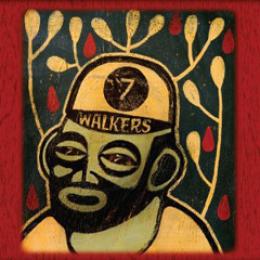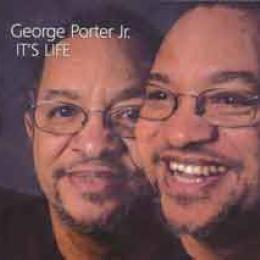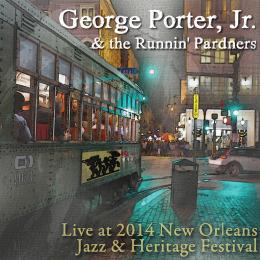George Porter Jr. is a legendary bassist best known as one of the founding members of The Meters. The group was formed in the mid 60's along with Art Neville, Leo Nocentelli and Joseph Zigaboo Modeliste. The Meters are considered, along with artists like James Brown, one of the progenitors of funk music and their work is highly influential on many other bands, both their contemporaries and modern musicians working in the funk idiom. The Meters disbanded in 1977, but later reformed in 1989. Today the original group still plays the occasional reunions as The Funky Meters, of which Porter and Neville are still members.
Porter is also the band leader of his own unique long term venture the Runnin' Pardners , and was also involved in other projects such as The Trio with Johnny Vidacovich, New Orleans Social Club, Deep Fried, Porter Batiste Stoltz and Bill Kreutzmann's newest band, 7 Walkers. He continues to be not only an renowned, accomplished studio musician and producer but is frequently in demand, and has been performing and recording with wide range of artists including Dr. John, Robbie Robertson, Willy DeVille, Robert Palmer, Patti Labelle, Jimmy Buffett, David Byrne, Johnny Adams, Harry Connick Jr., Earl King, Warren Haynes, Tori Amos, and Snooks Eaglin among many others.
I had the honor of interviewing the legendary artist at this years Bear Creek Music festival. There was a lot going on back stage that day and the only quiet place we could find was in the front seat of his van.
HGMN: Looking back over your entire music career, since the very beginning, what would be your most memorable experience?
GPJ: Ooh... (Laughs)
HGMN: I know that you have many but what is the first thing that comes to mind?
GPJ: If I had to think of the most memorable...I would say the very first year of the jazz and heritage festival when it moved out to the fairgrounds, that would actually have been the 2nd year of the jazz and heritage festival.
HGMN: What year was this?
GPJ: Oh, that's a good question. Um, I don't know the year (laughs). You may have to go back and research that. Man, I don't remember. I don't even remember how many years I've been doing it. I played the site with the original Meters and while we were on stage performing Stevie Wonder came out on stage and played keyboards on one song and drums on another song. And what was the most amazing part about the whole thing was that Stevie played keyboards and he played drums and Allen Toussaint shortly after that had mentioned that there was nothing else on the drums that can be played after Stevie left the stage. But Zigaboo got back behind the drums and played the next 30 minutes of some of the most amazing drums you'll ever hear and Allen said Zig just blew him away. He was like, "Wow!" That had to be one of the moments that stick out. Playing with Earl King, playing with Irma Thomas back when I was a kid, those are also memorable moments for me. That was the beginning of something.
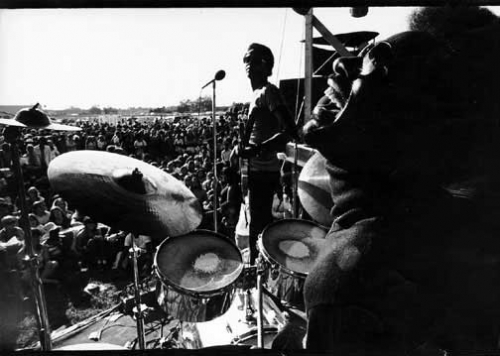
HGMN: Growing up who were your biggest idols?
GPJ: My biggest idols were guys who never got to be anybody. They were just great New Orleans musicians. Benjamin Francis, actually his nickname was Popie, Popie and his grandfather; I kind of contribute those two musicians in New Orleans that carried me from infancy to that stage of reasoning, musically.
HGMN: How old were you at this time?
GPJ: I was between 10 or 11. I got my first guitar when I was 8 years old.
HGMN: What was the name of the first band you were in?
GPJ: The first band that I was in, I really wasn't in the band, it was Herbert Wing's band. He would be another musician that I looked up to like Popie. But Herbert Wing had a band called the Royal Nights. Basically, I was like the first "roadie" in the history of New Orleans music (laughs). We didn't have a title for the guy that moved gear back then. I was that guy. I kind of helped move gear and set stuff up. And because I played drums, bass and guitar, If anybody wanted to go take a run or go to the bathroom, back then they were playing fraternity houses and stuff like that, I would be the sub when someone would run off and do what they had to do.
HGMN: What was the turning point when you first realized that you were a professional musician?
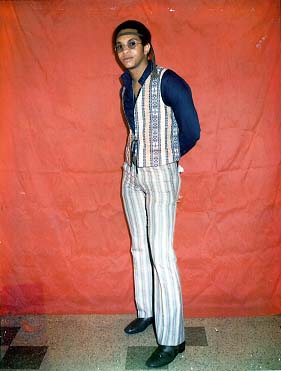 GPJ: I think that turning point came the first time I walked into this club called the 808 in New Orleans. Walter Washington was the guitar player, a saxophone player named Frank Motin and the other two guys; I can't remember who they were. They were the keyboard player and drummer and I can't remember their names to save my soul. I've been thinking about that for a year or two because that conversation came up once before. They were all playing in this club called the 808. Oh! The bass players name was Overton. I remember him because I took his gig. I was 16 years old. I was tall and I wore dark sunglasses and I had a lot of hair on my head so I got through the door. I ended up playing that gig 6-8 months before they figured out that I wasn't even old enough to be in there. That's when I realized that I think I had become a real player because I had infiltrated a gig being played by a professional musician and got his gig. I got his gig because he was lazy and I was just energetic and I played better. After that me and Walter would just close this joint down. On many occasions the owner would just give us the keys and we would lock the club up when we would leave. After the gig me and Walter would sit there, Walter knew how to play but he just didn't know what he was playing. So I would start teaching him the names of these chords and stuff because I was also a guitar player. He had all these great chord structures that were beautiful and I would sit there and spell them out to him, tell him what they were. So me and Walter would do that every night, Friday, Saturday and Sunday nights and then I would go back to school on Monday. Eventually I dropped out of school when I decided that I wanted to do this forever.
GPJ: I think that turning point came the first time I walked into this club called the 808 in New Orleans. Walter Washington was the guitar player, a saxophone player named Frank Motin and the other two guys; I can't remember who they were. They were the keyboard player and drummer and I can't remember their names to save my soul. I've been thinking about that for a year or two because that conversation came up once before. They were all playing in this club called the 808. Oh! The bass players name was Overton. I remember him because I took his gig. I was 16 years old. I was tall and I wore dark sunglasses and I had a lot of hair on my head so I got through the door. I ended up playing that gig 6-8 months before they figured out that I wasn't even old enough to be in there. That's when I realized that I think I had become a real player because I had infiltrated a gig being played by a professional musician and got his gig. I got his gig because he was lazy and I was just energetic and I played better. After that me and Walter would just close this joint down. On many occasions the owner would just give us the keys and we would lock the club up when we would leave. After the gig me and Walter would sit there, Walter knew how to play but he just didn't know what he was playing. So I would start teaching him the names of these chords and stuff because I was also a guitar player. He had all these great chord structures that were beautiful and I would sit there and spell them out to him, tell him what they were. So me and Walter would do that every night, Friday, Saturday and Sunday nights and then I would go back to school on Monday. Eventually I dropped out of school when I decided that I wanted to do this forever.
HGMN: How did you and Art meet?
GPJ: I was still doing that gig and I think I was still 16 when that happened too.
HGMN: How old was Art?
GPJ: At that time he was 26 because Art is 10 years older than I am. I was at Herbert Wing's house one day when Art called and he needed a guitar player to play a gig that night. Herbert was working that night and he couldn't make the gig but he told Art that he had somebody that could hold down the gig. At that time Herbert was very confident that I could go and play the gig.
HGMN: Was Art in a band at this time?
GPJ: No. At the time Art was just going out and doing a solo thing but he would always bring a guitar player with him. He would be playing his keyboards and he would bring a guitar player that knew his stuff. I didn't really know his stuff (laughs). But I knew a lot of the songs he was playing. He was just doing a lot of common New Orleans songs. So I knew those songs. I had a great set of ears so even if I didn't know the songs I knew the formula. That's how me and Art first met. But Art was looking for a guitar player that could take solos and I wasn't that guy. I was strictly a rhythm guitar player. So he thought I sucked (laughs).
HGMN: Did he tell you that?
GPJ: Oh yeah, he told me. He basically told me that I won't be calling you anymore (laughs).
HGMN: How did that affect you?
GPJ: Well, I knew why. I also knew that I was not the guitar player he was looking for. So I knew what was going on. Maybe a year and a half later I was playing with a band called the Irving Banister & the Allstars. Irving Banister was the guitar player who played this famous solo on a Danny White song, "Kiss Tomorrow Goodbye". Irving's fame in New Orleans was huge. That song was bigger than Fats Domino in New Orleans and Danny White was a serious major league player during that period of time.
HGMN: Was this in the 6o's?
GPJ: This was in the 60's, yes. I was playing bass in Irving Banister's band and Art came in one night, and Fats Domino used to frequently visit that club, it was called the Cindy Club, and Art came in one night and heard me play. And at the end of the night he walked up to me and said, "Now that's the instrument you ought to be playing. Do you want a gig?" (Laughs) Art Neville, he was famous, so it was like, Art Neville or Irving Banister, Art Neville or Irving Banister. It was no contest. So I told him, "Yeah, sure!" And that band he was hiring me for, that band became The Meters.
The band started out with Leo Nocenrelli on guitar, the drummer whose name I can not remember and Gary Brown on Saxophone. The drummer had got sick. He had a minor surgery and it took him out for about ten days. Zigaboo came in to replace him for those ten days. Art had been playing with Zigaboo with the Decon Jones Band so he knew to call Zig. So Zig came in and played the gigs with us...Glenn! The original drummer's name was Glenn but I can't remember his last name. Glenn came in like on a Sunday night to let everybody know that he was healthy and back ready to work again and heard Zig playing. Zig was actually playing on Glenn's drums. The owner of the club told us later that Glenn had came in and that he just kind of stayed for about a half hour in the back. He didn't let anybody know he was there and then he split. That Monday Glenn came and picked up his drums and left.
HGMN: Without saying anything?
GPJ: I never seen or heard from him. Art may have talked to him but he never said a word to us. I never asked Art what happened. The little bit of information we got was that the club owner said that Glenn had came in that night. The club owner said how could he want his gig back after seeing Zig play?
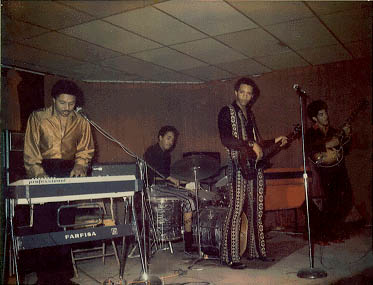
HGMN: So The Meters disbanded in 1977?
GPJ: Yes, pretty much.
HGMN: What did you do right after that?
GPJ: After that I kind of got high for 9 months. I just kind of sank into just getting high. Getting high and staying home and doing nothing. I kind of avoided music. I played a little bit. I played with David Lassidy and his brother. Actually, we were playing in the street down in the French Quarter on Decatur Street, playing for tips. I did that for a good...I did that even after I got out of the stupor. I did it for a while until I kind of got back on the road. David died and that kind of ended that too. That's what I did. I did that for maybe two years. But I had gotten sober and I had started another band called Joyride. Actually, I've got to put this kids name in there...
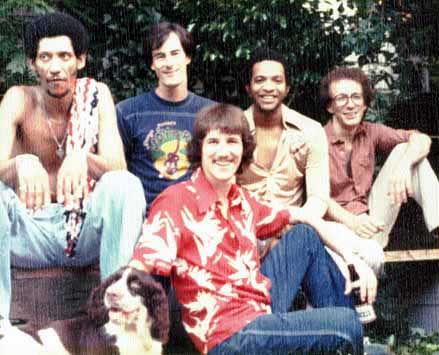
HGMN: Was this in the 80's?
GPJ: This would be the 80's. In 1980 there was this kid named Bruce Blaylock, a little guitar player from Tulane University. Bruce called me up and said would I mind if he rehearsed my music because he had gig tapes and stuff like that... You know something, this was after Joyride. In 1980 I did the Joyride Band which was Bruce McDonald, Kenny Blevins... there were two drummers in that band, Kenny Blevins and Ricky Sebastian. Kenny started the band and Bruce was married to Lee Harris, she was called Little Queenie, a singer song writer. Little Queenie and Bruce had gotten together and she wanted Kenny to come play in her band and Bruce wanted Ricky to come play in our band so they swapped drummers on me (laughs). So that's how I got to have Ricky Sebastian. That band lasted for a year but like most of the things that was involved in my life in those years it was just too much of getting high. It kind of outweighed the reality. It was everybody getting high on different things. It was dumb. I ended up playing with Joyride to start out with...I don't even remember what Bruce Blaylock called that other band back then. I think it was George Porter & Friends, something like that. Then around 85' or something like that...what the hell was I doing in 85'? That's a good question there (laughs). I don't really remember what happened in 85', um, when did I get sober, 89?
HGMN: So it was like a 10 year period?
GPJ: Yeah...I may have to research myself.
HGMN: When did you start The Runnin' Pardners?
GPJ: Runnin' Pardners started somewhere in the 80's. It started as a trio, Phil Parnell on keys, a drummer named Harley Blanchard and myself. As a trio playing a little club called The Absolute in uptown New Orleans. And that band kind of went away because Leo Nocenrelli had contacted me about playing a gig out in California with him. So I went out and played the gig with Leo out there and it went so well I was like, "Hey man, let's try and do that gig in New Orleans." We called the band, Geo-Leo. And he said, "Sure, let's try to do it around jazz fest." I said, "Cool, let's do that."
In New Orleans I hired Russell Batiste as the drummer and David Torkanowsky as the keyboard player. Well, Phil Parnell being a keyboard player that I was working with all the time got very upset about the fact that I hired Torkanowsky to play the gig and not even considering the fact that he didn't play Meter music well at all. I played in David Lassidy's band that Phil was in and we played "Hey Pockey Way" and stuff like that and Phil is a jazz musician, he did not have a good handle on that kind of music. For me it was a no brainer who the keyboard player was going to be. Torkanowsky is a jazz musician as well but his heart is in R&B. So he would be the kind of guy that would go home and do his homework and be ready for the gig. And we did the gig and it went really good. People at the jazz festival who were there and had heard about it, they invited us to come and play jazz fest the next year. So we did, Geo-Leo with Russell and Torkanowsky...wait, Torkanowsky didn't play the festival...oh, he did play the festival. We had a club date that night at Jimmy's in uptown New Orleans but Torg couldn't make the night time gig. A keyboard player named John Otan played the nighttime gig. So at that nighttime gig Art shows up at the club. (Laughs) So it was like a tag team thing, every time we would start a song Art would tap John on the shoulder and say, "I remember that one" and he would sit down and play the song and then he would get up after the song was over and then John would sit down. Art did that to him all night (laughs). So Art basically played the whole gig almost. At the end of the night John said, "Man, should I just give you the check?" So that's when Art, Leo, Russell and myself started playing together. Now if I can just figure out when Brian Stoltz started with Funky Meters we can know when that ended.
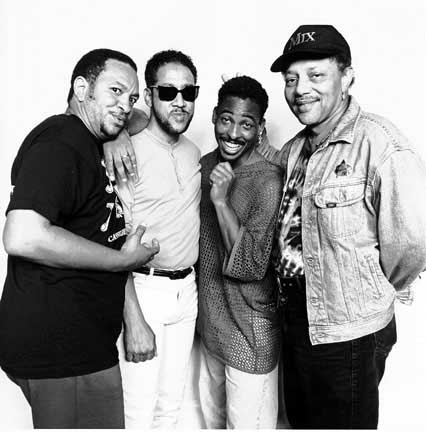
HGMN: Did you and Art continue to stay in touch after The Meters broke up?
GPJ: Not Really. I kinda limited my conversation with everybody. Art left everything and started doing stuff with his brothers. For me that was a betrayal. I pretty much didn't want to have much to do with him. He left me there with Zig and Leo which was even more fucked up. So when I left Zig and Leo they still were playing as The Meters for a little while longer, another 6-8 months maybe, up until Leo said he was moving to L.A. He moved and the band really went away probably somewhere in the middle of the 80's.
HGMN: You've worked with artists such as Paul McCartney, Robbie Robertson, Robert Palmer, Patti Labelle, David Byrne...
GPJ: Let me clear up this Paul McCartney thing. We didn't really work with Paul. We did play on a song. We played percussion and sang on a Mardi gras song. When Paul was in New Orleans doing his album it was during Mardi Gras season and that was the "Venus and Mars" record. And just for the hell of it he did a Mardi Gras song. I don't believe that record made it anywhere other than New Orleans. And even if it got played anywhere else on the planet I never heard it outside of when we did it in the studio. But somehow it has always been put out in the world that The Meters played with McCartney. That never happened. The Meters never played with McCartney. On that Mardi Gras record I believe it was only Leo Nocentelli and myself in the studio when that happened. Earl King was there, a bunch of other New Orleans people that used to just hang around the studio - Benny Spellman, Tony Owens and Curley Moe. Basically all we did was play tambourines, play cowbells and make joyful noise for that recording. So that's just to clear up the Paul McCartney thing.
HGMN: Out of all the session recordings, who would you say was your most favorite to work with?
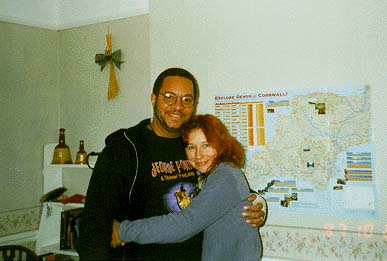 GPJ: Hmmm, I would say Tori Amos and it was the most challenging.
GPJ: Hmmm, I would say Tori Amos and it was the most challenging.
HGMN: How many projects do you have going now?
GPJ: There's 7 Walkers, Funky Meters, Runnin' Pardners and for the last couple of months the original Meters. Out here at Bear Creek I'm doing John Scofield, Funky Meters, The Runnin' Pardners and the Trio and then a whole bunch of sittin' in.
HGMN: Which is your most favorite?
GPJ: Of What I'm doing today?
HGMN: Which do you enjoy most out of all the projects that you're currently doing?
GPJ: Runnin' Pardners, absolutely. That's my baby. Funky Meters...I mean, that's going to be what it is. My absolute favorite is Runnin' Pardners. If I can make the kind of money that Funky Meters make with Runnin' Pardners I wouldn't be playing with anybody else (laughs).
HGMN: Tell me about your new album?
GPJ: It's a work of love of songs that I've been playing; well I should say that I've been listening to most of my life. The songs were never being performed. They were never played by The Meters or any Meter incarnations. I just thought that these songs should get played.
HGMN: Out of all the songs in your catalog which would you say is your most favorite?
GPJ: It would probably be a Runnin' Pardners song called "Happy Song".
HGMN: Why is that your favorite?
GPJ: Because it kind of feeds to that inner smile that everyone misses every now and then. It kind of goes away and you have to work hard sometimes at getting it back. So singing "Happy Song", it's about something that we would all love to do regularly.
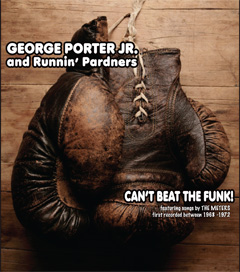
Can't Beat the Funk revisits with a fresh modern groove 16 of Porters favorite Meters tracks that were recorded, but never really performed live. The Runnin' Pardners undeniable energy and driving funk make these songs their own.
Tour Dates
11/17/11 - GPJ & RP - SECOND STREET LIVE - Fort Smith, AR
11/18/11 - GPJ & RP - George's Majestic Lounge - Fayetteville, AR
11/19/11 - GPJ & RP - Proud Larrys - Oxford, MS
11/26/11 - All Star Band /Featuring Porter - Boulder Theater - Boulder, CO
11/27/11 - The Inaugural Trance Blues Jam Festival - Boulder Outlook Hotel - Boulder CO
12/01/11 - GPJ & RP - THUNDERBIRD CAFE - PITTSBURGH, PA
12/02/11 - GPJ & RP - The 8X10 - BALTIMORE, MD
12/03/11 - GPJ & RP - Hiro Ballroom - New York, NY
12/13/11 - George Porter Jr - The People Say Project - New Orleans, LA
12/26/11 - GPJ & RP - Howlin Wolf - New Orleans, LA
01/07/12 - GPJ & RP - SEMINOLE CASINO COCONUT CREEK - COCONUT CREEK, FL
01/09/12 - GPJ & RP - Jam Cruise 10
01/10/12 - GPJ & RP - Jam Cruise 10
01/20/12 - GPJ & RP - Cervantes' Other Side - Denver, CO
01/21/12 - GPJ & RP - Cervantes' Other Side - Denver, CO
http://georgeporterjr.com
http://www.facebook.com/GeorgePorterJr
http://www.myspace.com/georgeporterjr



